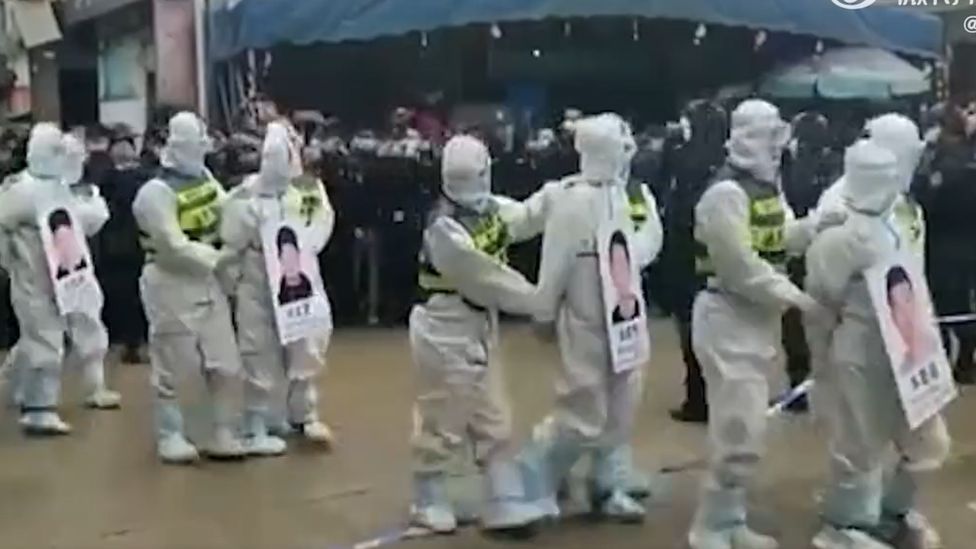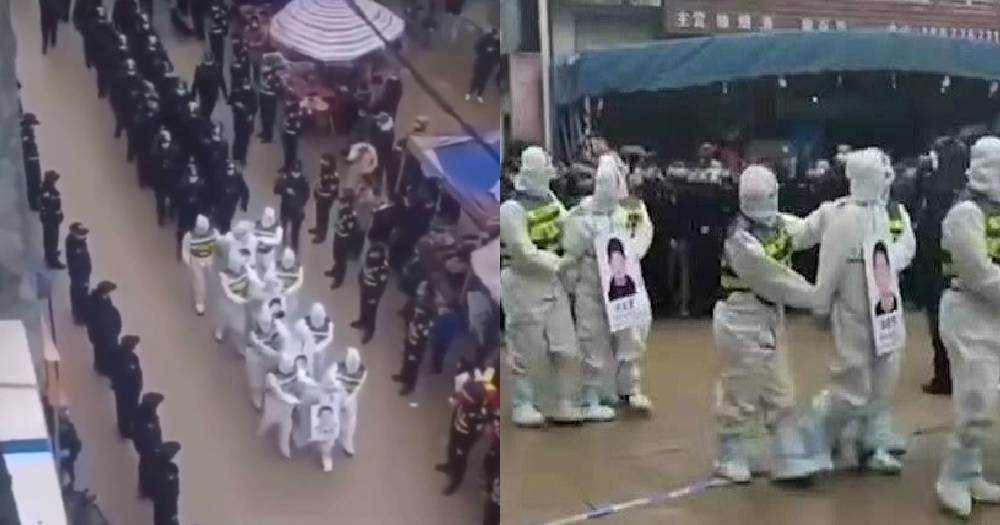Follow us on Telegram for the latest updates: https://t.me/mothershipsg
Four suspects accused of flouting Covid-19 rules in China have been paraded through the streets in Guangxi Province, China, AFP reported, citing local media.
 Image via Weibo.
Image via Weibo.
The four suspects were seen wearing hazmat suits and face masks while carrying placards with their photos and names.
Video clips of the incident also showed a large crowd watching the four suspects, who were surrounded by policemen, some of them armed.
According to the Chinese state-run media Guangxi Daily, the four suspects were accused of smuggling people across the border of China, and were publicly punished for their crimes.
The parade took place in Jingxi city, which is in close proximity to the China-Vietnam border.
The media outlet said the public shaming serves to deter "border-related crimes", as well as to increase the public's awareness of Covid-19 regulations.
The heavy-handed approach reminiscent of the Cultural Revolution era has been criticised by social media users and several state-run media outlets.
However, local authorities and police said they were "following orders" in handing out the punishment, adding that there was nothing "inappropriate" about the punishment, Chinese state media KNEWS reported.
Public shaming is one of the disciplinary measures
According to AFP, the local government announced a series of disciplinary measures to punish those who flouted Covid-19 regulations in August. Public shaming was one of those measures.
Two of the suspects allegedly helped two foreigners to cross the Chinese border illegally in October, state-controlled media Global Times (GT) reported.
When one of the stowaways tested positive for Covid-19, about 50,000 residents in Jingxi city was quarantined, which according to GT, "affected the local economy and local people's livelihoods".
Criticism from Chinese social media users
Taking to Chinese social media site Weibo, Chinese netizens criticised the public shaming.

"We can't allow such actions (public shaming) to be continued."

"No one is safe in a lawless society."

"The ultimate reason that laws exist is to protect human rights. What is the meaning of having laws when they can't even protect human rights?"
However, there were also several commenters who were on the opposite side of the fence.

"I support this (public shaming) to a certain extent. I feel it would be better to have a fixed location for this."

"(Public shaming) is a good tradition, we don't have to care about the dignity of those people (the suspects) who are shameless. Why should law-abiding people deal with the risks that come from their (the suspects') actions? (We) have to raise the stakes on such criminal activity in order to ensure that our society can function efficiently."

"When I think of the hardships faced by those who live near the borders, I feel even better that the smugglers were publicly shamed."
Parading suspects is a banned practice
While public shaming used to be a "common practice" during the Cultural Revolution, it has been banned in China since the 1980s.
Since the 1980s, the Supreme People's Court of China, the Supreme People's Procuratorate and the Ministry of Public Security have jointly released numerous notices to ban parading criminals or suspects through the streets as this could cause a "bad impact", GT reported.
Another notice issued in June 1988 stated that such measures should be rectified and related officials should be punished.
However, the authorities in Guangxi reportedly issued a notice on Jul. 27 which included publicising personal information of those who were suspected of illegal cross border activities.
Since then, public shaming parades have taken place in at least three places around the city.
"Shocking"
A commentary on Chinese official state media Xinhua said it was "shocking" that the "political mentality" of Jingxi city authorities was still "stuck in the olden days".
"Such actions (public shaming) that trample on the law not only erode the rule of law, but also bring shame to modern civilisation".
Speaking to GT, a professor from the China University of Political Science and Law, Zhu Wei, said the measure insulted the dignity of the citizens, which is something that's protected under the law.
Zhu added that it was against the civil law in China to release the suspects' personal information.
Preparing for the Winter Olympics
The Chinese government has consistently pursued a "zero-Covid" strategy, with tight border restrictions, targeted lockdowns, and lengthy quarantine periods.
The city of Xi'an, which has a population of 13 million, entered a lockdown on Dec. 23, after a surge of Covid-19 infections was detected in the city.
According to AFP, 26 officials in the city were punished for mishandling the situation.
China is also gearing up for the 2022 Beijing Winter Olympics, which will take place from Feb. 4 to Feb. 20, 2022.
With strict border restrictions in place, those arriving in Beijing for the Games are expected to be kept inside a strictly-enforced "closed-loop", Reuters reported.
Read more:
Follow and listen to our podcast here
Top image via Weibo
If you like what you read, follow us on Facebook, Instagram, Twitter and Telegram to get the latest updates.
